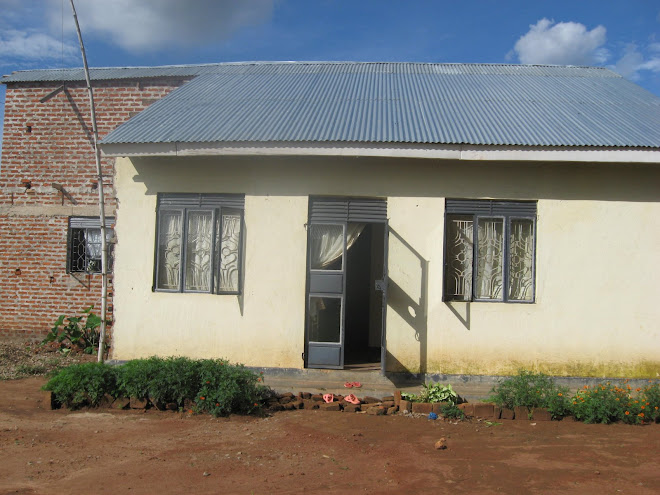So, here's what I've been pondering the last month or so:
It’s well known that culture shock has stages. Upon arriving in Uganda I was stuck by how different everything was – a developing country in the tropics looks a lot different than DC or Colorado. There’s the small girl who at home would be playing with her dolls but here is carrying around her baby sister. Or the gaggle of kids that are out to collect firewood. How many kids do you know who are willing to spend the day collecting firewood to make supper and grasses to make brooms to sell? How bout a group of 10 kids running away from a kitten in terror? Or a two year old kneeling to greet you. Not to mention the everyday differences: local markets instead of grocery stores, basins and good ‘ol elbow grease instead of washing machines, skirts instead of trousers.
Even when I’m shopping the man who will try to sell me an old sheet for $5 will sell me a handmade basket for 75 cents and think he’s ripped me off. I miss every other social clue (sometimes I’m sure everyone here thinks I’m a bumbling idiot), and often find my self asking “what did you say?”, “what do you mean by that”. It’s one thing to say we all speak English, but another to realize how many colloquialisms are in a language. Here if someone offers you something, and you say “that’s okay, don’t worry about it” they’ll hand it right over. “How’s home?” has come to mean “how’s your family?”. And a ‘yes’ can be indicated by the raise of an eyebrow.
Yet, after spending time with Ugandans I came to the firm conclusion that people are the same everywhere. We all laugh and cry; people gossip; some are talkative, some are quite; parents worry about their kids; kids shrug off their parents; students think teachers want them to fail; teachers feel bad when their students fail.
Now, however, I’m realizing that we’re not all the same. Many things are similar, but there are core beliefs that everyone holds, and while they vary person to person, they vary a lot between cultures. Sometimes it’s little things, like realizing the word for ‘wife’ in Lusoga is ‘cook’. Or that it’s assumed that, as a Muzungu, I must 1) have lots of money and 2) want to give it to everyone who asks. This is a misconception brought about by the fact that most Muzungus who come here bring a lot of money, and are more than happy to give it away (not that I blame them, there really are a lot of people here who need the money, I just hate the stereotype).
Other things are a bit harder. Like sending children, “go to town and get me tomatoes” or “you, student, go pick me a chair”. It really bothered me at first because that’s not how we treat children, or students, at home. And, yet, aren’t a lot of our kids spoiled? We treat our children as equals, and yet they aren’t. We still expect them to listen to us, do as we say, and not argue, too much.
In some ways I think it ties back to language. At home every child knows that the proper way to ask for something is “may I please have____”. In Lusoga it’s simply “mpaku ____” where ‘mpa’ means ‘give me’ and ‘ku’ makes it polite. Here the please is implied. And when you think about it, how much choice does a child have if their parent says “will please carry this?” We may insert the words ‘will you’ and ‘please’ but they’re basically just formalities. Yet, having grown up in America, it’s really hard for me to get used to not hearing ‘please.’ It’s so small, but it can really bother me. Just give me time though. By the time I come back I won’t be saying please and will annoy everyone.
But, outside of language, more is expected from children here. We don’t expect our children to cook, clean, and iron, while we relax from a hard day and catch up on the news. Yet, doesn’t that encourage independence? How many students at home make it all the way to university before learning how to cook or clean? And we have it easy. Cooking does not involve lighting a fire or a charcoal stove; washing clothes just requires pushing a few buttons; water comes out of the tap fresh and ready to drink. Our children can read textbooks, pass exams, navigate a computer and the internet, but can they live on their own?
Children here can wash clothes, fetch water, take care of the baby (ever seen a 6-year-old looking after her baby brother?), and yet they can’t read a textbook (which is written in their 2nd, 3rd, or 4th language) and so call themselves ‘backwards’ and ‘poorly educated’.
Who’s to say they’re not forwards and we’re backwards?
That’s a bit of what I’ve been pondering, as well as how to help students to not fail their exams. Anyone with suggestions about how to teach 50+ students who have no time to study, no textbooks, and who understand only about 75% of what I say….I’m wide open to suggestions. We’re covering insects (butterflies, house flies, mosquitoes, and bees) and hopefully some ecology next term. I’m also picking up one stream of mathematics, also S.2, which should be a lot of fun. I think I’m finding that while I prefer studying biology, I prefer teaching mathematics. At least there I’m on solid ground and there’s less memorization involved.
P
Subscribe to:
Post Comments (Atom)

No comments:
Post a Comment